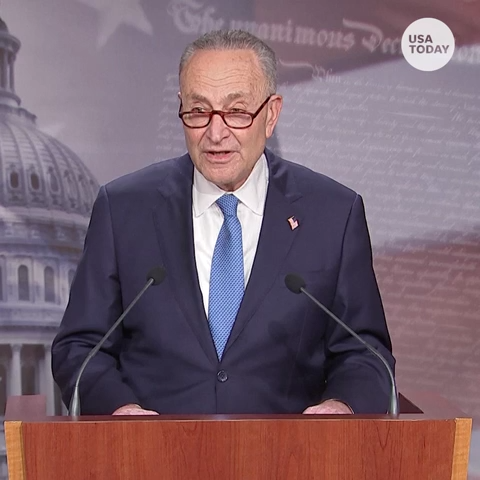Donald Trump driving a crowd into a violent attack on the Capitol may be the defining image that will remain in the minds of most Americans. But that assault on Jan. 6 wasn’t the only coup Trump planned. After his ridiculous legal ploys had all floundered; after his attempts to strong arm governors and secretaries of state had failed; after he had wined and dined state legislators in an attempt to prevent the certification of votes … Trump had another scheme.
The New York Times reports that Trump worked with Department of Justice lawyer Jeffrey Clark on a plan that would have removed acting Attorney General Jeffrey Rosen, then Trump and Clark would use the DOJ to order Georgia legislators to reverse the outcome of the election in that state while blocking Congress from counting the Electoral College vote.
This plan was apparently only halted because of an accident of timing. And it shows once again how close Trump came to completely gutting American democracy.
It was absolutely clear that Trump was frustrated that former attorney general William Barr—who had done everything else to support Trump—refused to use the DOJ to support Trump's legal team in their baseless claims of election fraud. That doesn’t take speculation, because Trump said it openly. Barr refused to go along, telling reporters that the department had found no evidence of fraud. As a result, Barr stepped down in mid December and then Deputy Attorney General Jeffrey Rosen took on the acting AG role.
As The New York Times reports, Trump immediately began to pressure Rosen to interfere in the few remaining steps before the Electoral College votes were counted. The day after Barr’s departure, Trump called Rosen to the White House. Trump pushed Rosen to announce that he was appointing special counsels to look into voter fraud, with one focusing on the unsupported claims—and outright lies—that Rudy Giuliani and Sidney Powell had been spreading about Dominion Voting Systems. And Trump called on Rosen to do what Barr had refused, file legal briefs in support of the lawsuits filed by Trump’s legal team.
When Rosen refused, Trump continued to press. He called Rosen repeatedly. He called him back to the White House and confronted him multiple times. Trump complained that the Justice Department was “not fighting hard enough for him” and pushed Rosen on why DOJ attorneys were not supporting the “evidence” being put forward by Giuliani and Powell.
But as Rosen continued to refuse, Trump went around him to work with Clark. According to the Times report, Clark told Trump that he agreed there had been fraud that affected the election results. Clark tried to pressure his bosses at the DOJ into holding a new conference to announce that it was “investigating serious accusations of election fraud.” But Rosen also refused to go along with Clark.
As Trump and Clark worked together, much of the attention was focused on Georgia, where Trump complained that the U.S. attorney in Atlanta, Byung Pak, was also not trying hard enough to defend Trump. In the conversation in which Trump attempted to threaten Georgia secretary of state Brad Raffensperger, he complained about Pak. DOJ officials warned Pak that Trump was “fixated” on forcing his office to go along with his plans. That led to Pak’s resignation just a day before the Jan. 6 insurgency.
As Trump was pushing on Raffensperger, Clark was continuing to try and force Rosen to act on Trump’s behalf. Clark drafted a letter falsely saying the DOJ was investigating voter fraud in Georgia and tried to get Rosen to send it to state legislators. Rosen again refused to go along with the scheme and on New Year’s Eve, Rosen and deputy attorney general Richard Donoghue met with Clark to tell him that his actions were wrong.
Rather than backing off, Clark went back to Trump. He met with Trump over the weekend, then came back to tell Rosen what they had decided. Trump and Clark concocted a plan in which Trump would replace Rosen with Clark. Clark would then use the DOJ in an effort to prevent Congress from counting the Electoral College results. Clark not only explained this plan to Rosen, but offered to allow Rosen to stay on as his deputy.
Rosen refused to go along and demanded a meeting with Trump. But what stopped Trump and Clark’s plan from moving forward was not some momentary lapse into reason or decency on Trump’s part. Instead, what happened was that, just as Rosen was preparing to meet with Trump, news broke that Raffensperger had recorded his conversation with Trump. Hearing Trump’s direct effort to force the Georgia secretary of state into “finding” votes, along with Trump’s threats over what would happen if Raffensperger failed to go along, apparently stiffened enough spines among the second tier officials at the DOJ that a whole group threatened to resign if Rosen was removed. The “Clark Plan” the group decided would “seriously harm the department, the government and the rule of law.”
That same evening, Rosen, Donoghue and Clark met at the White House with Trump, White House attorney Pat Cipollone, and other lawyers. Cippollone made it clear to Trump that pulling the trigger on the Clark Plan would not just generate chaos at the Justice Department, but result in a strong pushback from Congress, including investigations.
After nearly three hours of argument, Trump reluctantly backed away from firing Rosen and using the DOJ to smash open the election.
But it came that close. If the phone call with Georgia officials had not been released, if Rosen had not been able to rally the support of his deputies, if Trump had simply ignored Cippollone and ordered Clark to carry on … what would have happened next is anyone’s guess.
Is it too late to add additional charges to the impeachment?
